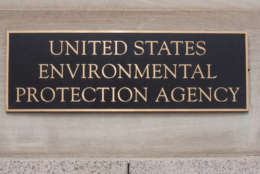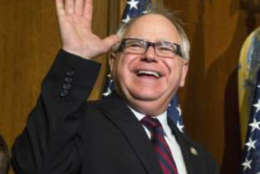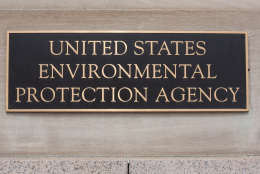American Federation of Government Employees
-
Working for the government was once a lifetime deal, but Senior Correspondent Mike Causey says those days may be gone.
July 26, 2017 -
Rep. Todd Rokita (R-Ind.) reintroduced the Promote Accountability and Government Efficiency (PAGE) Act after a similar bill died in the previous Congress. The legislation would give agencies the authority to remove or suspend new employees "without notice or right to appeal, from service by the head of the agency at which such employee is employed for good cause, bad cause or no cause at all."
July 24, 2017 -
Rep. Anthony Brown (D-Md.) introduced the Federal Employee Pension Act of 2017 to reduce the mandatory 4.4 percent pension contributions by new federal employees.
July 18, 2017 -
A 2018 budget proposal from the House Budget Committee asks federal employees to contribute more toward their retirement as a way to find $203 billion in mandatory spending cuts next year.
July 18, 2017 -
New legislative proposals from the Defense Department try to streamline the acquisition system, but do they compromise oversight?
July 12, 2017 -
According to the Veterans Affairs Department's new reports detailing all major disciplinary actions for its workers, VA is on track to fire fewer people in 2017 than it has during the past six fiscal years. Federal employment experts say the new adverse action reports lack some significant details about VA's efforts to improve accountability and transparency.
July 10, 2017 -
The House Armed Services Committee wants to expand the $40,000 Voluntary Separation Incentive Pay for DoD civilians to 2021.
July 10, 2017 -
Nine bold House Republicans have challenged the White House plan to cut federal retirement benefits by $149 billion.
June 30, 2017 -
Gary Morton, AFGE's VERA/VSIP lead negotiator, says employees also need to consider what budget cuts could mean for themselves and the agency in 2018.
June 26, 2017 -
The Environmental Protection Agency is proposing to cut about 8 percent of its workforce through a VERA/VSIP program by Sept. 2.
June 20, 2017 -
About 100 House Democrats wrote to Speaker Paul Ryan (R-Wis.) and Minority Leader Nancy Pelosi (D-Calif.), voicing their opposition over the president's four major proposed changes to federal retirement. The administration included the proposals in the fiscal 2018 budget proposal and would have a significant impact on both current and future federal employees and retirees.
June 16, 2017 -
Democrats and Republicans voiced their concern that EPA's 31 percent cut in funding for fiscal 2018 could do more harm than good, and leave states "holding the bag" for the federal agency.
June 15, 2017 -
The House will pass the VA Accountability First and Whistleblower Protection Act, clearing the way for the President to sign the bill later this week. Some lawmakers and veterans service organizations see the bill's passage as a major win after years of debate over new accountability legislation. But federal employee groups say the bill would do more harm than good.
June 13, 2017 -
Environmental Protection Agency acting Deputy Administrator Mike Flynn said more details about what positions are included in the VERA/VSIP program will be available this summer.
June 01, 2017 -
John O’Grady, president of AFGE Council 238, which specifically represents EPA employees, says cutting the agency's budget by one-third will impact federal, state, and local levels of public health, not to mention hurt employee morale.
May 29, 2017















